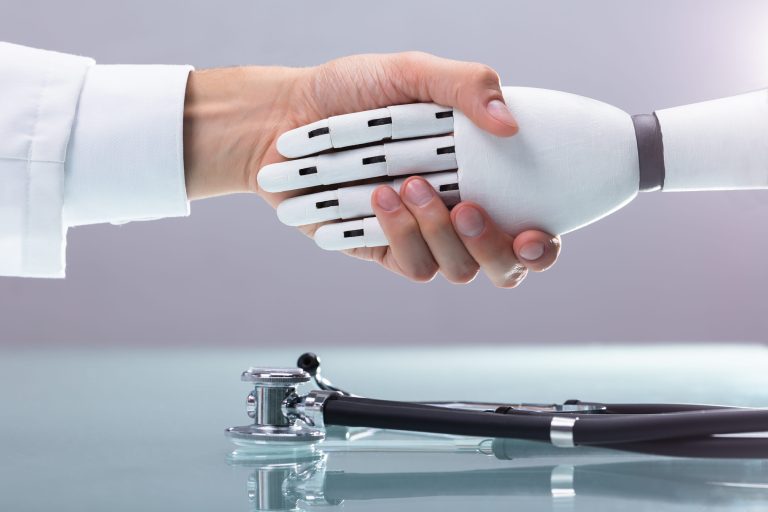NHS Secures AI Funding to Enhance Healthcare Efficiency and Patient Care
NHS Receives AI Fund to Improve Healthcare Efficiency
The National Health Service (NHS) is set to enhance patient diagnosis and treatment with the introduction of advanced AI technology, supported by a new £21 million fund. This initiative, known as the AI Diagnostic Fund, will enable NHS Trusts to apply for financial assistance aimed at fast-tracking the implementation of AI imaging and decision support tools. These technologies are particularly focused on diagnosing serious health conditions such as cancers, strokes, and heart diseases.
Health and Social Care Secretary Steve Barclay has committed to deploying AI-driven stroke-diagnosis technology across all stroke networks by the end of 2023, a significant jump from the current coverage of 86 percent. This move aims to improve treatment speed for countless stroke patients. Barclay highlighted the transformative capabilities of AI in healthcare, emphasizing its potential to enhance patient care and reduce waiting times. “This is a great example of how we’re evolving the NHS to provide faster care,” he stated, noting the urgency to cut down waiting lists.
As of April 2023, the NHS was facing an unprecedented backlog, with 7.42 million people awaiting treatment— the highest figure since records began in 2004. Among these patients, nearly 3.09 million had been waiting over 18 weeks, and around 371,000 for more than a year. The median waiting time for treatment stood at 13.8 weeks, nearly double the pre-COVID median of 7.2 weeks recorded in April 2019.
One crucial application of the AI Diagnostic Fund will be the deployment of AI tools for analyzing chest X-rays, a pivotal diagnostic tool for lung cancer—the leading cause of cancer-related deaths in the UK. With over 600,000 chest X-rays conducted monthly in England, the integration of AI in NHS Trusts is expected to improve early cancer detection significantly, ultimately enhancing patient outcomes.
AI’s implementation in the NHS has already shown promising results, particularly in accelerating stroke diagnosis, which has been linked to a tripling of patients’ chances of living independently post-stroke. Sridhar Iyengar, Managing Director of Zoho Europe, noted that “Artificial Intelligence is poised to be vital in many sectors, including digital healthcare, enabling faster and more accurate decision-making by healthcare professionals.” He emphasized the importance of establishing trust with the public while maintaining high standards of data management to safeguard patient privacy.
The funding from the AI Diagnostic Fund is geared towards supporting the introduction of any AI diagnostic tool that NHS Trusts wish to utilize, although proposals must demonstrate cost-effectiveness to gain approval. The UK government has previously invested £123 million in 86 AI technologies, leading to improvements in stroke diagnosis, cardiovascular monitoring, and home-based care management.
The push for AI in healthcare aligns with the NHS’s overarching goal of adopting cutting-edge technologies to enhance patient care while ensuring value for taxpayers. Dr. Katharine Halliday, President of the Royal College of Radiologists, expressed her support for the government’s £21 million fund, emphasizing the necessity to embrace innovations that can elevate diagnostic capacity in a time of strain. “All doctors wish to provide optimal care for their patients,” she said, highlighting the critical nature of timely diagnostics and the promise AI holds in achieving efficiency and prioritizing urgent cases.
AI is poised to play a pivotal role in the future of diagnostics. To ensure the safe implementation of AI technologies in healthcare, the government has established the AI & Digital Regulation Service. This initiative assists NHS personnel in navigating the intricacies of AI regulations, fostering a smoother path for developers and users to introduce new products effectively.
The investment in AI technology is particularly important as the NHS currently allocates £10 billion each year to medical technology, with the global market expected to hit £150 billion next year. Access to cutting-edge technologies offers vast potential benefits for patients, such as improved disease prevention, earlier diagnostics, more effective treatments, and quicker recoveries.
Dr. Antonio Espingardeiro, an IEEE member and expert in software and robotics, noted that as AI becomes more advanced, it can efficiently perform tasks that were once the sole responsibility of humans. The technology’s potential within the medical field is immense, capable of analyzing massive datasets and identifying patterns or anomalies far more quickly than humans could. We are at the brink of a transformative era where machine learning could significantly enhance the role of medical practitioners. The full potential of this technology to aid the healthcare sector remains to be fully explored.
Looking forward, the integration of AI and robotics could address some of the most pressing challenges in healthcare, offering the scalability necessary for effective service delivery and promoting proactive care. With AI’s support, NHS staff can anticipate enhanced capabilities in diagnosing and treating patients, ultimately leading to better health outcomes and a more streamlined healthcare system.
For those interested in deepening their understanding of AI and big data from industry leaders, the AI & Big Data Expo will be held in Amsterdam, California, and London. This event will be co-located with Digital Transformation Week.
Teachers in England Approved to Utilize AI
In a significant move, educators in England have received permission to incorporate artificial intelligence into their teaching methods. This decision aims to enhance learning experiences and engage students in innovative ways. By leveraging AI tools, teachers can provide personalized learning, streamline administrative tasks, and access a wealth of resources to support their curriculum.
AI’s Impact on the Cryptocurrency Sector
The role of artificial intelligence in the cryptocurrency market is increasingly prominent. AI technologies are being applied to improve trading strategies, enhance security measures, and analyze market trends. As the crypto landscape evolves, the integration of AI stands to transform how investors engage with digital currencies, offering sophisticated tools for risk management and predictive analytics.
Sam Altman: Embracing the Era of Superintelligence
Sam Altman, CEO of OpenAI, recently highlighted the onset of an era defined by superintelligence. This period marks a transformative phase in AI development, where machines are expected to surpass human cognitive capabilities. Altman emphasized the potential benefits, as well as the ethical considerations that come with deploying such powerful technologies in society.
Magistral: Mistral AI Challenges Major Tech Players
Magistral is emerging as a challenger to prominent technology companies with its advanced reasoning model, Mistral AI. This innovative approach seeks to rival existing AI solutions by focusing on problem-solving capabilities and logical reasoning. As Magistral sets out to disrupt the status quo, industry watchers are eager to see how it influences the competitive landscape of AI technology.
Magistral: Mistral AI Challenges Big Tech with Reasoning Model
The AI Blockchain: What Is It Really?
Apple Opens Core AI Model to Developers Amid Measured WWDC Strategy
Stay updated with our premium content and latest tech news delivered straight to your inbox.
Categories
- Applications
- Companies
- Deep & Reinforcement Learning
- Enterprise
- Ethics & Society
- Industries
- Legislation & Government
- Machine Learning
- Privacy
- Research
- Robotics
- Security
- Surveillance
- Sponsored Content
Explore Other Publications
- Developer
- IoT News
- Edge Computing News
- MarketingTech
- CloudTech
- The Block
- Telecoms
- Sustainability News
- TechHQ
- TechWire Asia
Receive all our premium content and latest tech updates directly to your inbox.
Country Selection
Select your country from the list below:
Permissions
By submitting your email, you acknowledge that you have read and agreed to our Terms and Privacy Notice.







